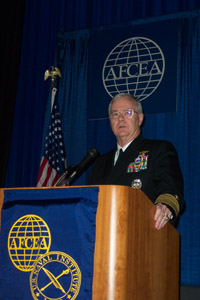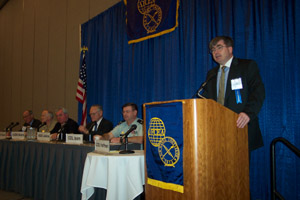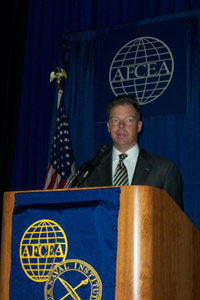Thursday, February 3, 2005
Quote of the Day:
“This war will test our resolve to defend and encourage freedom around the world.”
—Adm. Timothy J. Keating, USN, commander of the U.S. Northern Command
 |
| Adm. Timothy J. Keating, USN, commander of the U.S. Northern Command, gives Thursday’s luncheon address at West 2005. |
The homeland security focus came from the military officer tasked with protecting the territorial United States from attack. Adm. Timothy J. Keating, USN, commander of the U.S. Northern Command, described the many facets of the command’s mission while putting the war on terrorism in perspective.
When the al Qaida terrorists struck on September 11, 2001, the United States did not have unity of command for homeland defense, the admiral said. No one thought is was necessary. The North American Aerospace Defense Command (NORAD), which he also commands, was focused externally, not internally. Now, NORAD is very focused internally as well as externally. About 75 percent of NORAD’s sorties are flown by members of the Air Guard or Reserves.
However, scrambling jet fighter aircraft to deal with a homeland security threat is a last resort. True homeland security can be achieved only with layered security employing various measures such as airport passenger security. And, this requires that the Northern Command work closely with other government agencies at various levels.
Adm. Keating offered that his command is redefining jointness and interoperability as it builds relationships. It is vital to establish effective relationships before disasters occur, he noted. And, intelligence and information are critical to the command’s success.
“This war will test our resolve to defend and encourage freedom around the world,” he declared. “We are at war; it will be a long war; we will prevail.”
Moving offshore, a panel of experts discussed the concept of sea basing. Panel moderator Lt. Col. Frank Hoffman, USMCR (Ret.), research fellow at the Center for Emerging Threats and Opportunities, opened the discussion with a comment about the lack of mention given to the topic in the speech given 48 hours earlier by the chief of naval operations. Not only should the admiral have spoken about it, the colonel said, he should take the lead on sea basing.
 |
Panelists discussing sea basing are (r to l) panel moderator Lt. Col. Frank Hoffman, USMCR (Ret.), Col. Ron Isom, USA, Maj. Gen. Harry Jenkins, USMC (Ret.), Vice Adm. Charles W. Moore, USN (Ret.), Rear Adm. Richard O’Hanlon, USN, and Rear Adm. George Worthington, USN (Ret.). |
Col. Ron Isom, USA, Futures Center logistics chief, U.S. Army Training and Doctrine Command, emphasized that the United States must come up with a solution set to avoid another Turkey situation. If it does not, “then we are just fooling ourselves,” he said. The Army remains a heavy force and will be for many more years, and there is no Air Force heavy lift capability that serves all of the Army’s needs. The colonel added that any sea-basing concept will rely heavily on the Navy’s Sea Shield defense system.
Maj. Gen. Harry Jenkins, USMC (Ret.), director, business development and congressional liaison, ITT Industries, offered that the core of sea basing will be whatever the maritime pre-positioned force will look like. This sea-basing force must be joint, as it will include the Army with its own pre-positioned ships.
Rear Adm. George Worthington, USN (Ret.), former commander of the Naval Special Warfare Command, discussed the presence of special operations forces in sea basing. Their presence in the littoral environment will affect warfare greatly, as all the services’ special operations forces will be in future sea basing. This will bring a new dimension to littoral combat.
Rear Adm. Richard O’Hanlon, USN, director, Standing Joint Force Headquarters, U.S. Joint Forces Command, raised several issues that must be determined for sea basing to be effective. Many questions remain to be answered, he said, including what kind of joint command and control a sea base should have; whether it should be a joint headquarters; if a joint headquarters should be based there; and whether it should be a special operations force base.
The importance of support for military personnel came as no surprise to the many active-duty and retired military personnel in attendance. Achieving it, however, was another story, as the day’s Military Affairs Advisory Council Breakfast speaker explained.
Christopher Michel, founder and president of Military.com, described to the audience the many hurdles he had to overcome to establish his Web site to help military personnel best use their entitled benefits. While his was a business story, it also described just how difficult it could be—both culturally and technologically—to create a central repository to connect service members to all of their benefits.
Michel related how he had to pound the pavement visiting venture capitalists for three months a few years ago before he was rewarded with funding. At that, after receiving $5 million in startup money, he learned he was competing against four other military benefit Internet startups, including one funded by H. Ross Perot. His venture suffered many of the same growing pains that plagued other dot-com sites, including a series of layoffs that reduced his workforce by 80 percent with funds running out.
However, the company closed a number of business deals and reworked its business plan as it grew successful. The culmination of his efforts was the site’s acquisition by Monster late last year. This enabled service members to use the vast resources of that large firm in concert with Military.com’s benefits packages.
 |
Christopher Michel, founder and president of Military.com, gives Thursday’s Military Affairs Advisory Council Breakfast address at West 2005. |
Michel pointed out that transition points in a military life often are difficult for an individual to handle alone. In the course of establishing ways of helping service personnel access their benefits, the site began to branch out into providing benefits of its own. Michel noted that Monster has 300,000 employers as clients, and this has helped establish a military mentor program that features 60,000 people. And, his site has just won a contract for service member’s spouse employment.
“You’re in a noble profession,” he told the active and former military personnel in attendance. “Take advantage of that—take advantage of the network.”
—Make plans now for West 2006, to be held January 10-12 at the San Diego Convention Center.




Comments